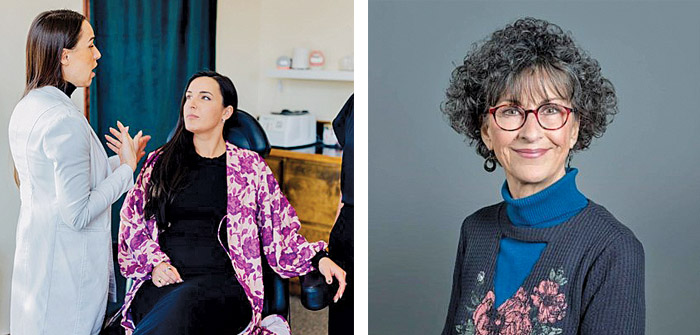((L) Joy King seated and talking with one of her staff. (R) Deby Grant | Photos courtesy of Bruce Barrett)
It might be surprising to hear that there was not a Federal declaration to end the COVID pandemic response until mid-May, 2023. The pandemic spanned much of the last three years.
A recent report from the Oregon Employment Department, Disparate Impacts of the Pandemic Recession in Oregon, lists this event as causing the greatest economic upheaval in Oregon history. The report also identifies the service industries including hospitality and leisure, childcare, healthcare, food service, skin and hair care and private educational services as being disproportionately impacted.
These sectors are overwhelmingly staffed by women and comprise at least 44 percent of women owned businesses so it is understandable that women were disproportionately impacted by the COVID pandemic.
There are several reasons identified as factors for the disproportionate impact. A February, 2023 article from Utah State University by Lafkas, Christenese and Madsen, The Impact of COVID on Women and Work, says that, unlike their spouses, 59 percent of women surveyed experienced a negative impact on their career due to layoffs and changes in the nature of their work. The article also reveals that over three million American women left the workforce during the first year of the pandemic to address childcare responsibilities or were unable to comply with vaccination, quarantine and remote work requirements.
Women have been slow to return to the workplace according to the America Works Data Center. They say that at lease one million women are still missing from the pre-pandemic workforce. That might not be all bad news. Research data shows significant growth in the number of women entrepreneurs.
A recent SCORE article, The State of Women Entrepreneurs, reports that women are starting new businesses at a faster pace than men with the growth rate of women owned business over 15 percent greater and revenue growth over 30 percent greater. Indications are that many women are choosing entrepreneurship as an alternative to returning to the workforce because it provides them more flexibility and self-determination than they had as employees.
Joy King, founder and president of Ageless Health Medicine specializes in Aesthetics Cosmetic Medicine. She founded her business in Bend in 2019 just prior to the pandemic. She says, “The pandemic had a huge impact on my business.” She and her business felt the impact of supply line shortages, the need for flexibility in employee schedules and patient’s concerns about health and safety. King says she struggled with shortages such as saline solution and other key ingredients and materials needed in her services but most importantly, she was able to retain staff by being flexible.
In response to the pandemic, King identified key business decisions that sustained her including scrutinizing digital marketing channels to maximize her brand message, strengthening supplier relationship, increasing salaries of her trained staff and strengthening relationships with the local competitors in her industry.
“Never give up on what you believe in,” is the entrepreneurial vision that King relies on to guide her into the future.
Another local woman entrepreneur who felt the full impact of the pandemic is Deby Grant, founder and owner over the last 17 years of Sage School of Massage and Esthetics located in the NW Crossings district of Bend. Grant’s business fits several of the categories for businesses most impacted by being a service business in the healthcare field and being a private professional school. She found the need to pivot, sometimes daily, to meet changing government mandates, safety and health concerns of students and staff and her own cash flow needs.
The Esthetics Program was on pause for the entire year of 2022 due to the uncertainty of government regulations regarding direct contact. In other programs, Grant was able to employ audio visual equipment and on-line Zoom sessions. This required staff training and in some cases, equipping students with technology.
In the true spirit of entrepreneurship, Grant is adapting and improving as she moves forward post-pandemic. She is revitalizing her business’s community and group identity to remove the sense of isolation and provide “professional belonging.” Grant says, “It is important for employers to recognize that staff demands more from an employer and expects them to provide that sense of community.”
Grant also believes that Sage School will need less physical space in the future. She recognizes that students in the future will more willingly embrace remote learning and this will require the program and staff to adapt. When asked about the key element that sustained her business during such difficult times, She responded, “I worked to create a professional environment that did not have divisiveness.”
It is clear that professional women in the workplace experienced more impact from the pandemic due to dramatic changes in workplace and family demands. However, they are returning to the workplace with a new perspective on work/life balance and many are pursuing new career paths through entrepreneurship. They seem to be on the right path. The SCORE article reports that women owned businesses are growing. 63 percent are expecting revenues to increase this year and 47 percent are planning to expand.




